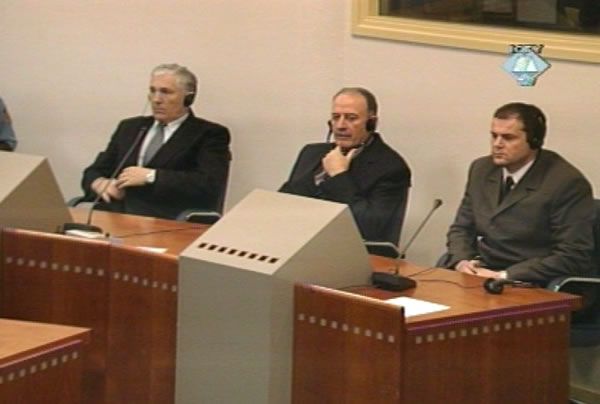Home
WILL THE VUKOVAR TRIAL BE HELD IN ZAGREB OR IN BELGRADE?
Chief Prosecutor Carla Del Ponte submitted a formal application for the referral of the case of the former JNA officers, charged with the massacre Vukovar area, to the courts in Croatia or Serbia-Montenegro. Del Ponte notes that both states are ready and able to try them in accordance with international standards. The main difference lies in the maximum sentence that can be imposed if they are convicted: in Croatia it is 20 years and in Serbia and Monte Negro 40 years in prison.
 "Vukovar three" in the courtroom
"Vukovar three" in the courtroom Chief Prosecutor has left to the judges to decide on the state whose courts would try the case of three former JNA officers charged with the massacre at Ovcara, near Vukovar. In her formal application for the referral of the case, made public today at the Tribunal, Del Ponte suggests that the Chamber chooses either the courts in Croatia or in Serbia-Montenegro. She notes that there are “balanced arguments” in favor of both options.
The authorities in Croatia and Serbia-Montenegro, according to Del Ponte, have expressed their “willingness and readiness” to take on the Vukovar Three case; OTP has a good working relation and cooperation with both the Public Prosecutor’s Office in Zagreb and with the special prosecutor for war crimes in Belgrade and is convinced that both judiciaries are able to try the case in line with international standards.
In the application, the prosecution states that an argument in favor of a trial in Zagreb lies in the fact that the crimes were committed in the territory of Croatia, and “justice would be brought closer to the victims.” On the other hand, there is an argument for Belgrade: the actual perpetrators of the killings at Ovcara are currently on trial there. After the JNA entered the town on 18 November 1991, more than 200 people were taken from the Vukovar hospital to Ovcara.
From the standpoint of the accused themselves, there is a potentially significant difference between trials in Zagreb and Belgrade. According to the applicable Croatian law, the maximum sentence could be 20 years in prison, while according to Serbia and Monte Negro law, it could be twice as long.
The Chamber that will be appointed to decide on the issue can rule that the Ovcara case is too significant to be referred to local courts or that Mile Mrksic, Veselin Sljivancanin and Miroslav Radic are not in the category of “medium or low ranking accused” who, according to the Tribunal Rules, may be considered for referral. Until the indictment against Slobodan Milosevic was issued, the Vukovar Three were among the most wanted fugitives on the Tribunal’s list, often considered to be at the same level with Radovan Karadzic and Ratko Mladic. Mrksic, Sljivancanin and Radic are the only accused whose arrest was specifically sought in a Security Council resolution from 1998.
Last but not least, the Tribunal’s story about Ovcara remains untold. Slavko Dokmanovic was charged with the same crime and his trial was concluded in the summer of 1997, but the judgment has never been made public since the accused committed suicide a week before it was to be rendered.
Linked Reports
- Case : Mrksic et al. - "Vukovar Hospital"
- 2005-02-04 VUKOVAR THREE CASE TO BE DEFERRED TO CROATIA?
- 2004-10-07 OVCARA TRIAL TO BEGIN IN FIRST HALF OF 2005
- 2004-06-11 THE VUKOVAR THREE TO BE TRIED BEGINNING OF 2005
- 2005-05-12 BATTLE FOR VUKOVAR
- 2005-06-09 THE “VUKOVAR THREE” TO BE TRIED IN THE HAGUE
- 2005-07-01 'THE VUKOVAR THREE" REMAIN IN THE HAGUE
